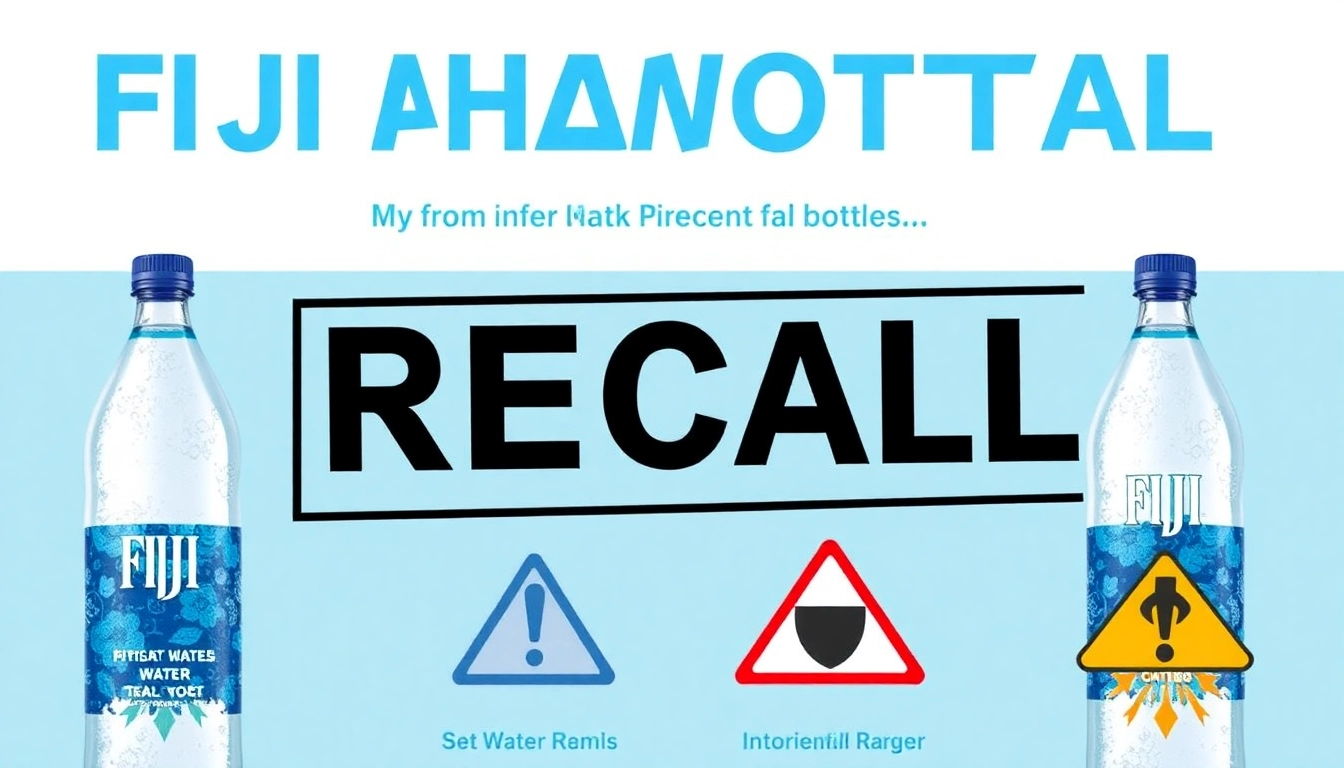Overview of the Fiji Water Recall
In May 2024, a significant consumer alert erupted as the U.S. Food and Drug Administration (FDA) announced the recall of approximately 78,533 cases, which is equivalent to about 1.9 million individual Fiji Natural Artesian Water bottles. This recall was prompted by concerns over contamination with elevated levels of manganese and the presence of certain bacteria. The recall predominantly involved bottles that were sold online through major retailers, including fiji water bottles recalled via Amazon.com.
What Happened and When
The recall was officially announced on May 23, 2024, after routine testing by Fiji Water revealed concerning findings related to the levels of manganese, a naturally occurring mineral that, in excessive amounts, can lead to adverse health effects. The affected products included 500 mL bottles of Fiji Water packaged in cases of 24, marking a notable event in the bottled water industry.
Initial Public Response
Upon the announcement of the recall, public sentiment shifted rapidly. Consumers expressed confusion and concern over the potential health implications associated with consuming the contaminated water. Social media and news channels became inundated with discussions revolving around the safety of bottled water and the reliability of brands like Fiji.
Retailers who had sold the affected products swiftly began removing the inventory from shelves and issuing statements to mitigate consumer worries. This swift action reflected an awareness of the potential backlash from customers highly conscious of their health and safety.
Class III Recall Details
The recall was classified as a Class III recall by the FDA. A Class III designation signifies that the recalled product is not likely to cause adverse health consequences, but there remains a risk of contamination. While the FDA stated that the risk was low, the decision to issue a recall was made as a precautionary measure. This classification added an additional layer of complexity to the recall’s narrative, leading to further questions among health professionals and consumers alike regarding the acceptable levels of contaminants in bottled water.
Health Implications of the Recall
The recall raised significant health concerns, particularly around manganese and potential bacterial contaminants. Understanding the implications of these substances is crucial for consumers who want to stay informed about what they ingest.
Understanding Manganese Levels
Manganese is a metal that is found in various foods and is also present in drinking water at certain levels. While it plays an essential role in several biological processes, high levels of manganese can lead to neurological issues and other health problems, especially in vulnerable populations such as infants and children. In the case of Fiji Water, the detected levels exceeded the recommended limits, triggering the FDA’s intervention.
Health authorities, including the Minnesota Department of Health, advise consumers to be aware of the sources of their drinking water and to understand any potential risks associated with contaminants. For bottled water brands, transparency regarding testing and contamination levels is essential to consumer trust.
Potential Health Risks
The primary health risks associated with excessive manganese consumption include:
- Neurological Issues: High manganese levels have been linked to cognitive deficits, particularly in young children, and can cause symptoms akin to Parkinson’s disease.
- Respiratory Problems: Long-term exposure can lead to respiratory complications, particularly in individuals with pre-existing conditions.
- Digestive Issues: Consuming contaminated water can lead to gastrointestinal disturbances, which can worsen if not addressed promptly.
Health experts emphasize the importance of consuming safe drinking water and recommend that consumers remain vigilant and informed about any recalls regarding their preferred brands.
Expert Opinions and Guidelines
Health professionals have reiterated the significance of monitoring manganese levels in water supplies. According to Dr. Emily Carter, a public health expert, “Regular testing of bottled and municipal water is essential to ensure that contaminants remain within safe limits.” She emphasizes that, while bottled water may seem a safer choice, it is crucial to ensure that the brand adheres to rigorous testing protocols to maintain consumer trust.
The FDA has also suggested that consumers who may have purchased the recalled Fiji Water keep abreast of recall announcements and closely follow manufacturer guidelines regarding product usage.
How to Identify Recalled Fiji Water Bottles
Identifying recalled Fiji Water bottles is crucial for consumers concerned about their health and safety. Below, we outline how to definitively recognize whether your product is affected by this recall.
Recognizing Affected Batch Numbers
The affected batch numbers for the recalled Fiji Water are labeled on the packaging. Consumers should look for product codes that were marked with “Best By” dates that fall between the range specified in the FDA’s recall announcement. Specific batch numbers can usually be found printed on the packaging, and consumers should check their products against the information provided by the FDA.
Visual Indicators of Recalled Bottles
Aside from batch numbers, consumers can visually inspect the packaging for any indications of tampering or damage. Bottles that appear unusual or have altered caps or seals should be scrutinized. If you suspect that the bottle shows signs of contamination or improper sealing, it is best to avoid consumption.
Safe Disposal Recommendations
For bottles identified as part of the recall, it is crucial to dispose of them safely. The FDA recommends returning the affected products to the place of purchase or following local disposal guidelines if returning is not feasible. This helps to ensure that the contaminated product does not make its way back into the consumer market.
What Consumers Should Do
In the event that consumers find themselves in possession of the recalled Fiji Water, it is important to act swiftly to mitigate any potential health risks.
Steps to Take if You Purchased Recalled Bottles
If you suspect that you have purchased a recalled bottle of Fiji Water, the first step is to identify the specific batch number and “Best By” date. Next, refrain from consuming the product and keep it in a separate area to avoid accidental consumption. Customers can visit the FDA website for further updates on the recall and safety announcements.
How to Seek Refunds or Replacements
Most retailers have implemented refund and replacement protocols for affected products. Consumers should retain their receipts and visit the store where they made their purchase to initiate the refund process or to discuss replacement options. Many retailers will provide a full refund regardless of receipt, emphasizing customer safety over profits.
Additionally, contacting Fiji Water’s customer service department can yield alternatives for those who wish to replace the product directly through the manufacturer. Customers have shared positive experiences with efficient refund processes, reflecting well on the company’s responsiveness to such incidents.
Contact Information for Queries
For any further questions related to the recall, consumers can reach out directly to Fiji Water’s customer service or consult the FDA hotline for the latest information. Staying informed can assist in making educated choices regarding bottled water consumption and potential risks.
The Future of Fiji Water
Looking ahead, the Fiji Water company faces the challenge of restoring its reputation post-recall while ensuring product safety remains a priority. This section explores the measures being implemented to effectively rebuild trust with consumers.
Company Response and Measures Taken
Following the recall announcement, Fiji Water executives publicly acknowledged the situation and committed to enhancing monitoring measures moving forward. The company has pledged to engage in rigorous testing protocols at every stage of production to ensure that contaminants remain below harmful levels.
Moreover, Fiji Water is working with health authorities to develop clearer messaging around product safety, demonstrating their intent to prioritize consumer welfare by keeping the public informed.
Restoring Consumer Trust
To regain consumer confidence, Fiji Water is implementing outreach programs that include transparency about water testing results, response strategies regarding product safety, and direct engagement with health professionals and consumers alike. By fostering open dialogue, the company aims to demonstrate its commitment to quality and safety.
Upcoming Product Safety Initiatives
The company has announced plans for new safety initiatives that include the introduction of improved bottling processes and educational campaigns aimed at educating consumers on the importance of water safety. These initiatives reflect a proactive approach toward preventing future incidents, thereby reinforcing Fiji Water’s standing as a trusted brand in the bottled water industry.



